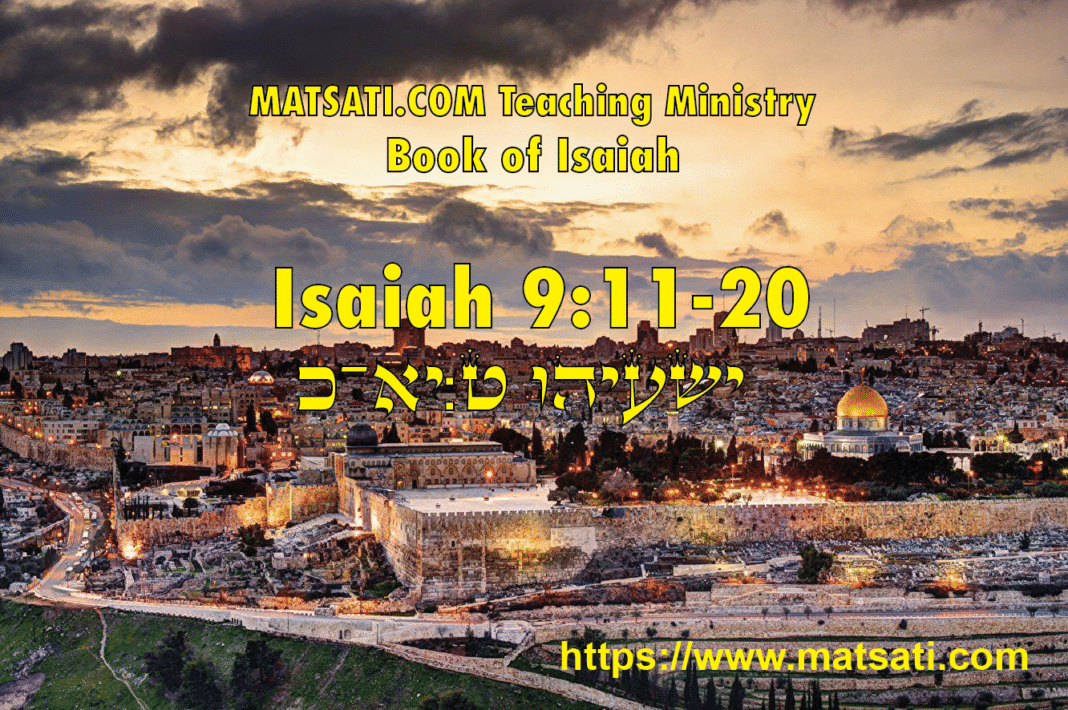Table of Contents
Introduction to Isaiah 9:11-20
When people walk in their pride, turn from recognizing that all things are given from heaven, and rely upon their own resources as opposed to trusting in the Lord God our Father in heaven, we are told in the Scriptures there will be a day of accounting. The Lord brought prophets, and righteous men to the nation to call them back to God’s holy ways, yet they refused. Eventually, the Lord brings a mighty nation against the people for the purpose of causing them to turn from their sinful ways, to repent, and return to the Lord. It is unfortunate that when these types of measures are necessary from the Lord, the people are so far gone, selfish, self centered, and arrogant, they are unable to listen, to hear the voice of God calling. What remains then is destruction, and the next generation of people to remember and recognize the error of the ways of their forefathers. This is how Isaiah continues according to Isaiah 9:11.
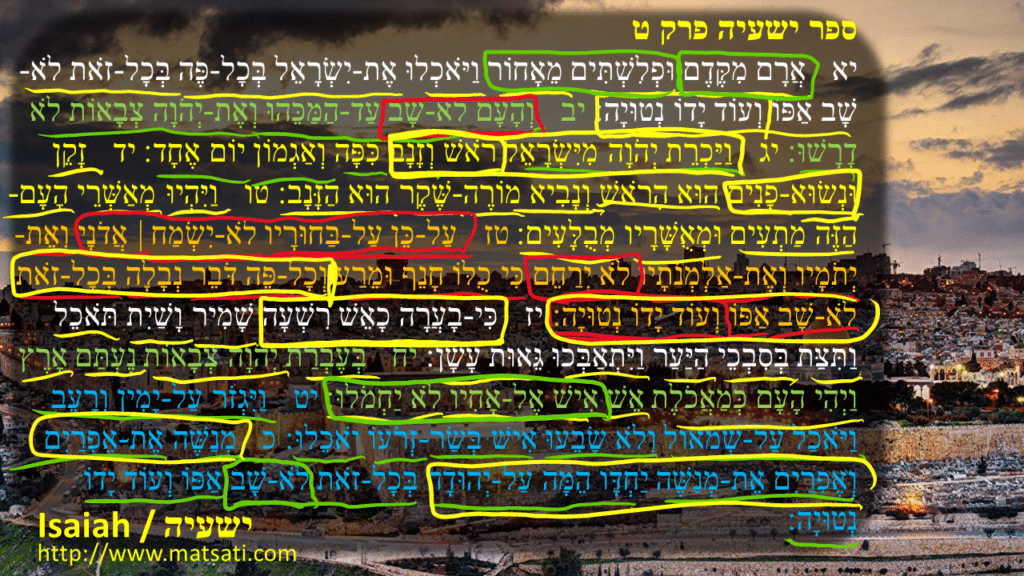
ספר ישעיה פרק ט
יא אֲרָם מִקֶּדֶם וּפְלִשְׁתִּים מֵאָחוֹר וַיֹּאכְלוּ אֶת-יִשְֹרָאֵל בְּכָל-פֶּה בְּכָל-זֹאת לֹא-שָׁב אַפּוֹ וְעוֹד יָדוֹ נְטוּיָה
Isaiah 9:12 states, “The Syrians before, and the Philistines behind; (אֲרָם מִקֶּדֶם וּפְלִשְׁתִּים מֵאָחוֹר) and they shall devour Israel with open mouth. (וַיֹּאכְלוּ אֶת-יִשְֹרָאֵל בְּכָל-פֶּה) For all this his anger is not turned away, but his hand is stretched out still. (בְּכָל-זֹאת לֹא-שָׁב אַפּוֹ וְעוֹד יָדוֹ נְטוּיָה)” These things suggest that the people are surrounded, there appears to be no escape. Isaiah says וְעוֹד יָדוֹ נְטוּיָה “but still his hand is stretched out.” This reminds us of the Torah according to Shemot / Exodus 17:8-13.
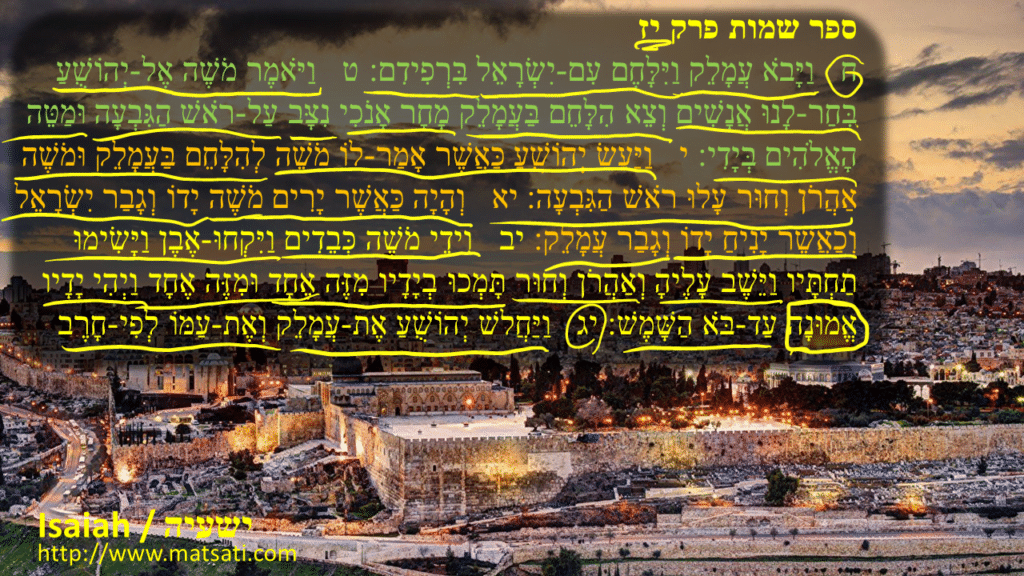
ספר שמות פרק יז
ח וַיָּבֹא עֲמָלֵק וַיִּלָּחֶם עִם-יִשְֹרָאֵל בִּרְפִידִם: ט וַיֹּאמֶר מֹשֶׁה אֶל-יְהוֹשֻׁעַ בְּחַר-לָנוּ אֲנָשִׁים וְצֵא הִלָּחֵם בַּעֲמָלֵק מָחָר אָנֹכִי נִצָּב עַל-רֹאשׁ הַגִּבְעָה וּמַטֵּה הָאֱלֹהִים בְּיָדִי: י וַיַּעַשֹ יְהוֹשֻׁעַ כַּאֲשֶׁר אָמַר-לוֹ מֹשֶׁה לְהִלָּחֵם בַּעֲמָלֵק וּמֹשֶׁה אַהֲרֹן וְחוּר עָלוּ רֹאשׁ הַגִּבְעָה: יא וְהָיָה כַּאֲשֶׁר יָרִים מֹשֶׁה יָדוֹ וְגָבַר יִשְֹרָאֵל וְכַאֲשֶׁר יָנִיחַ יָדוֹ וְגָבַר עֲמָלֵק: יב וִידֵי מֹשֶׁה כְּבֵדִים וַיִּקְחוּ-אֶבֶן וַיָּשִֹימוּ תַחְתָּיו וַיֵּשֶׁב עָלֶיהָ וְאַהֲרֹן וְחוּר תָּמְכוּ בְיָדָיו מִזֶּה אֶחָד וּמִזֶּה אֶחָד וַיְהִי יָדָיו אֱמוּנָה עַד-בֹּא הַשָּׁמֶשׁ: יג וַיַּחֲלשׁ יְהוֹשֻׁעַ אֶת-עֲמָלֵק וְאֶת-עַמּוֹ לְפִי-חָרֶב:
Shemot / Exodus 17:8-13
17:8 Then came Amalek, and fought with Israel in Rephidim. 17:9 And Moses said unto Joshua, Choose us out men, and go out, fight with Amalek: to morrow I will stand on the top of the hill with the rod of God in mine hand. 17:10 So Joshua did as Moses had said to him, and fought with Amalek: and Moses, Aaron, and Hur went up to the top of the hill. 17:11 And it came to pass, when Moses held up his hand, that Israel prevailed: and when he let down his hand, Amalek prevailed. 17:12 But Moses hands were heavy; and they took a stone, and put it under him, and he sat thereon; and Aaron and Hur stayed up his hands, the one on the one side, and the other on the other side; and his hands were steady until the going down of the sun.17:13 And Joshua discomfited Amalek and his people with the edge of the sword. (KJV)
We notice something about this Torah narrative, in this case, when the nation is walking in the ways of God, the Lord God Almighty will make our battles successful. On the other hand if a nation is living in unrepentant disobedience, the situation is turned around as Isaiah describes, אֲרָם מִקֶּדֶם וּפְלִשְׁתִּים מֵאָחוֹר “The Syrians before, and the Philistines behind.” Note what we read according to the Gospel of Luke. We are told in Luke 13 that Pontius Pilate slaughtered some Galileans. Those who brought the report to Yeshua desired to understand why God had allowed such a tragedy to occur. Yeshua responds saying, “Jesus said to them, ‘Do you suppose that these Galileans were greater sinners than all other Galileans because they suffered this fate? I tell you, no, but unless you repent, you will all likewise perish.’” (see Luke 13:2-3) Note the focus here Yeshua speaks of unrepentance leads to these things happening. This is the situation that Isaiah describes according to Isaiah 1-5, those who depend upon themselves as opposed to the Lord. When a man, woman, or child turns from the Lord, the outcome is progressive falling away that is coupled with a blindness that is the result of selfishness, pride, and the love of this world.
ספר ישעיה פרק ט
יב וְהָעָם לֹא-שָׁב עַד-הַמַּכֵּהוּ וְאֶת-יְהֹוָה צְבָאוֹת לֹא דָרָשׁוּ: יג וַיַּכְרֵת יְהֹוָה מִיִּשְֹרָאֵל רֹאשׁ וְזָנָב כִּפָּה וְאַגְמוֹן יוֹם אֶחָד:
Isaiah 9:13 states, “For the people turneth not unto him that smiteth them, (וְהָעָם לֹא-שָׁב עַד-הַמַּכֵּהוּ) neither do they seek the LORD of hosts. (וְאֶת-יְהֹוָה צְבָאוֹת לֹא דָרָשׁוּ)” Isaiah 9:14 “Therefore the LORD will cut off from Israel head and tail, (וַיַּכְרֵת יְהֹוָה מִיִּשְֹרָאֵל רֹאשׁ וְזָנָב) branch and rush, in one day. (כִּפָּה וְאַגְמוֹן יוֹם אֶחָד)” These verses speak plainly what is happening, the conclusion of the people לֹא-שָׁב “not turning” back to the Lord. Note the similar language according to Hosea 6:5 and Amos 4:6-11.
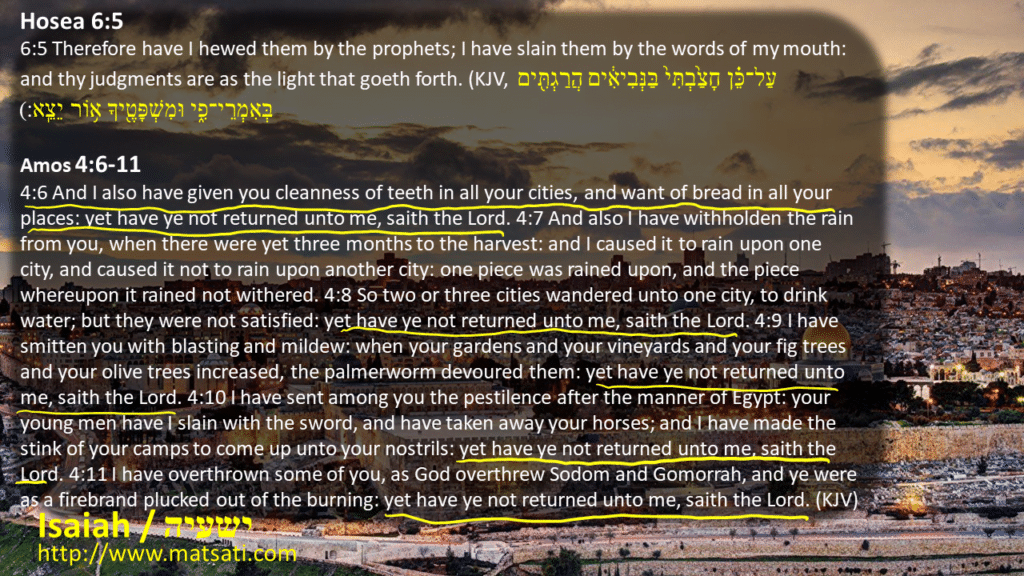
Hosea 6:5
6:5 Therefore have I hewed them by the prophets; I have slain them by the words of my mouth: and thy judgments are as the light that goeth forth. (KJV, עַל־כֵּ֗ן חָצַ֙בְתִּי֙ בַּנְּבִיאִ֔ים הֲרַגְתִּ֖ים בְּאִמְרֵי־פִ֑י וּמִשְׁפָּטֶ֖יךָ א֥וֹר יֵצֵֽא׃)
Amos 4:6-11
4:6 And I also have given you cleanness of teeth in all your cities, and want of bread in all your places: yet have ye not returned unto me, saith the Lord. 4:7 And also I have withholden the rain from you, when there were yet three months to the harvest: and I caused it to rain upon one city, and caused it not to rain upon another city: one piece was rained upon, and the piece whereupon it rained not withered. 4:8 So two or three cities wandered unto one city, to drink water; but they were not satisfied: yet have ye not returned unto me, saith the Lord. 4:9 I have smitten you with blasting and mildew: when your gardens and your vineyards and your fig trees and your olive trees increased, the palmerworm devoured them: yet have ye not returned unto me, saith the Lord. 4:10 I have sent among you the pestilence after the manner of Egypt: your young men have I slain with the sword, and have taken away your horses; and I have made the stink of your camps to come up unto your nostrils: yet have ye not returned unto me, saith the Lord. 4:11 I have overthrown some of you, as God overthrew Sodom and Gomorrah, and ye were as a firebrand plucked out of the burning: yet have ye not returned unto me, saith the Lord. (KJV, וְגַם־אֲנִי֩ נָתַ֨תִּי לָכֶ֜ם נִקְי֤וֹן שִׁנַּ֙יִם֙ בְּכָל־עָ֣רֵיכֶ֔ם וְחֹ֣סֶר לֶ֔חֶם בְּכֹ֖ל מְקוֹמֹֽתֵיכֶ֑ם וְלֹֽא־שַׁבְתֶּ֥ם עָדַ֖י נְאֻם־יְהוָֽה׃ וְגַ֣ם אָנֹכִי֩ מָנַ֨עְתִּי מִכֶּ֜ם אֶת־הַגֶּ֗שֶׁם בְּע֨וֹד שְׁלֹשָׁ֤ה חֳדָשִׁים֙ לַקָּצִ֔יר וְהִמְטַרְתִּי֙ עַל־עִ֣יר אֶחָ֔ת וְעַל־עִ֥יר אַחַ֖ת לֹ֣א אַמְטִ֑יר חֶלְקָ֤ה אַחַת֙ תִּמָּטֵ֔ר וְחֶלְקָ֛ה אֲשֶֽׁר־לֹֽא־תַמְטִ֥יר עָלֶ֖יהָ תִּיבָֽשׁ׃ וְנָע֡וּ שְׁתַּיִם֩ שָׁלֹ֨שׁ עָרִ֜ים אֶל־עִ֥יר אַחַ֛ת לִשְׁתּ֥וֹת מַ֖יִם וְלֹ֣א יִשְׂבָּ֑עוּ וְלֹֽא־שַׁבְתֶּ֥ם עָדַ֖י נְאֻם־יְהוָֽה׃ הִכֵּ֣יתִי אֶתְכֶם֮ בַּשִּׁדָּפ֣וֹן וּבַיֵּרָקוֹן֒ הַרְבּ֨וֹת גַּנּוֹתֵיכֶ֧ם וְכַרְמֵיכֶ֛ם וּתְאֵנֵיכֶ֥ם וְזֵיתֵיכֶ֖ם יֹאכַ֣ל הַגָּזָ֑ם וְלֹֽא־שַׁבְתֶּ֥ם עָדַ֖י נְאֻם־יְהוָֽה׃ שִׁלַּ֨חְתִּי בָכֶ֥ם דֶּ֙בֶר֙ בְּדֶ֣רֶךְ מִצְרַ֔יִם הָרַ֤גְתִּי בַחֶ֙רֶב֙ בַּח֣וּרֵיכֶ֔ם עִ֖ם שְׁבִ֣י סֽוּסֵיכֶ֑ם וָאַעֲלֶ֞ה בְּאֹ֤שׁ מַחֲנֵיכֶם֙ וּֽבְאַפְּכֶ֔ם וְלֹֽא־שַׁבְתֶּ֥ם עָדַ֖י נְאֻם־יְהוָֽה׃ הָפַ֣כְתִּי בָכֶ֗ם כְּמַהְפֵּכַ֤ת אֱלֹהִים֙ אֶת־סְדֹ֣ם וְאֶת־עֲמֹרָ֔ה וַתִּהְי֕וּ כְּא֖וּד מֻצָּ֣ל מִשְּׂרֵפָ֑ה וְלֹֽא־שַׁבְתֶּ֥ם עָדַ֖י נְאֻם־יְהוָֽה׃)
The language that is being used here is quite strong in regards to the judgment that comes due to the people remaining unrepentant. Isaiah’s words וַיַּכְרֵת יְהֹוָה מִיִּשְֹרָאֵל רֹאשׁ וְזָנָב “the Lord will cut off from Israel the head and the tail” is indicative of the leadership leading the people falsely and that of destruction behind unavoidable. The concept of רֹאשׁ וְזָנָב may be a reference to “the great and the small.” These concepts of judgment and רֹאשׁ וְזָנָב, the great and the small, reminds us of what is written according to Revelation 20:11-15.
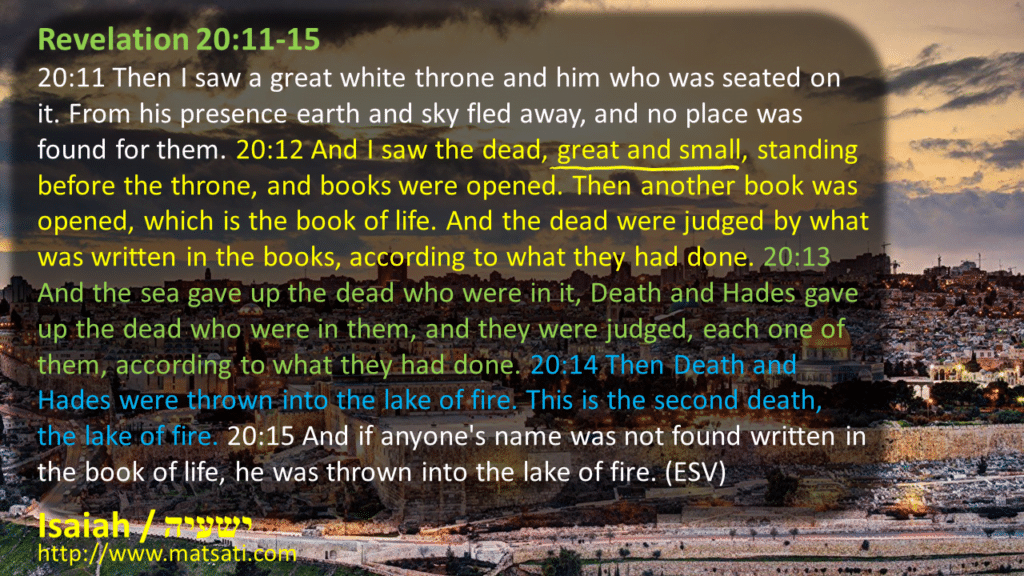
ספר הַהִתְגַּלּוּת פרק כ
יא רָאִיתִי כִּסֵּא לָבָן גָּדוֹל וְאֶת הַיּוֹשֵׁב עָלָיו אֲשֶׁר נָסוּ מִפָּנָיו הָאָרֶץ וְהַשָּׁמַיִם, וּמָקוֹם לֹא נִמְצָא לָהֶם. יב וְרָאִיתִי אֶת הַמֵּתִים, הַקְּטַנִּים וְהַגְּדוֹלִים, עוֹמְדִים לִפְנֵי הַכִּסֵּא וּסְפָרִים נִפְתְּחוּ. גַּם סֵפֶר אַחֵר נִפְתַּח, סֵפֶר הַחַיִּים. וְהַמֵּתִים נִשְׁפְּטוּ מִתּוֹךְ הַדְּבָרִים הַכְּתוּבִים בַּסְּפָרִים, לְפִי מַעֲשֵׂיהֶם. יג הַיָּם נָתַן אֶת הַמֵּתִים אֲשֶׁר בּוֹ, מָוֶת וּשְׁאוֹל נָתְנוּ אֶת מֵתֵיהֶם, וְאִישׁ אִישׁ נִשְׁפְּטוּ לְפִי מַעֲשֵׂיהֶם. יד הַמָּוֶת וְהַשְּׁאוֹל הֻשְׁלְכוּ אֶל אֲגַם הָאֵשׁ. זֶהוּ הַמָּוֶת הַשֵּׁנִי –– אֲגַם הָאֵשׁ. טו וּמִי שֶׁלֹּא נִמְצָא כָּתוּב בְּסֵפֶר הַחַיִּים, הֻשְׁלַךְ אֶל אֲגַם הָאֵשׁ.
Revelation 20:11-15
20:11 Then I saw a great white throne and him who was seated on it. From his presence earth and sky fled away, and no place was found for them. 20:12 And I saw the dead, great and small, standing before the throne, and books were opened. Then another book was opened, which is the book of life. And the dead were judged by what was written in the books, according to what they had done. 20:13 And the sea gave up the dead who were in it, Death and Hades gave up the dead who were in them, and they were judged, each one of them, according to what they had done. 20:14 Then Death and Hades were thrown into the lake of fire. This is the second death, the lake of fire. 20:15 And if anyone’s name was not found written in the book of life, he was thrown into the lake of fire. (ESV)
These things reveal to us we will all stand before God at one point in our lives to give an account, regardless of who we are, great or small, רֹאשׁ וְזָנָב (head or tail), etc. Now is the time of preparation, to seek the Lord, to walk in His ways, to ask for His presence and the presence of His Holy Spirit in our lives to help us to overcome these evil times, sin, and this world. The way that we prepare for the future is to live each day for the Lord. Our God is all powerful, He can destroy all in one day, He is also capable of restoring and redeeming all in one day! This is the power and the Love of our God for His people!
ספר ישעיה פרק ט
יד זָקֵן וּנְשֹוּא-פָנִים הוּא הָרֹאשׁ וְנָבִיא מוֹרֶה-שֶּׁקֶר הוּא הַזָּנָב: טו וַיִּהְיוּ מְאַשְּׁרֵי הָעָם-הַזֶּה מַתְעִים וּמְאֻשָּׁרָיו מְבֻלָּעִים:
Isaiah 9:15 states, “The ancient and honorable, (זָקֵן וּנְשֹוּא-פָנִים) he is the head; and the prophet that teacheth lies, he is the tail. (הוּא הָרֹאשׁ וְנָבִיא מוֹרֶה-שֶּׁקֶר הוּא הַזָּנָב)” Isaiah 9:16 “For the leaders of this people cause them to err; (וַיִּהְיוּ מְאַשְּׁרֵי הָעָם-הַזֶּה מַתְעִים) and they that are led of them are destroyed. (וּמְאֻשָּׁרָיו מְבֻלָּעִים)” It is a little difficult to understand why “ancient and honorable” can be one who teaches lies while reading the English translation. When looking at the Hebrew text we read זָקֵן וּנְשֹוּא-פָנִים “The old man and one who lifts/raise high the face” the words וּנְשֹוּא-פָנִים are translated as “honorable” in the KJV, were וּנְשֹוּא is the Qal passive participle ms construct meaning to lift up or raise the face, from the sense of pride. We note that in Isaiah’s time, Isaiah brought the truth of God, there were also other prophets, these were false prophets that brought a message of prosperity. Isaiah’s message was coupled to repentance and seeking the Lord. The false prophet’s message was lacking these fundamental concepts. The idea of these being the tail is reminiscent of the Torah according to Bamidbar / Numbers 11:1-2.
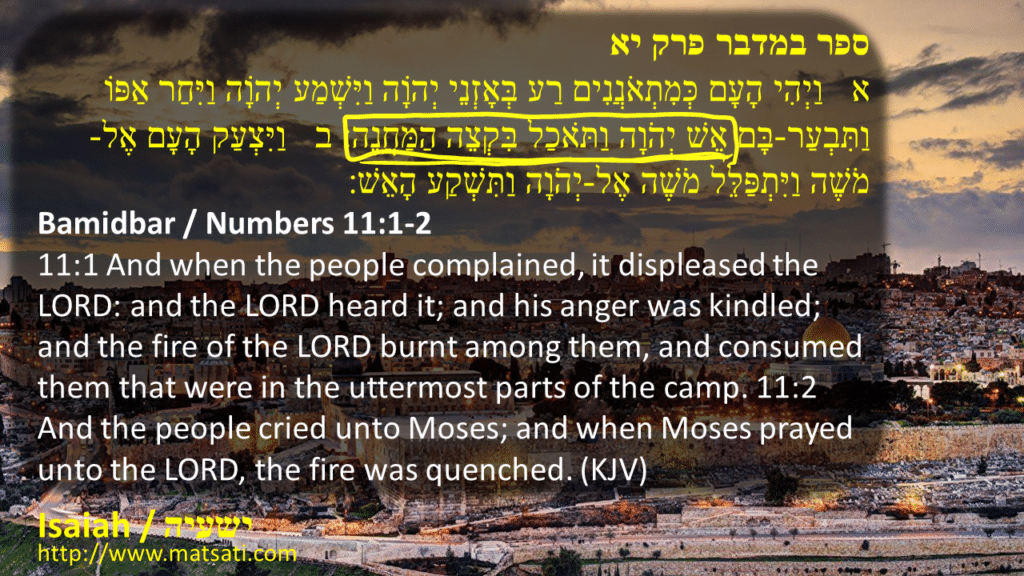
ספר במדבר פרק יא
א וַיְהִי הָעָם כְּמִתְאֹנֲנִים רַע בְּאָזְנֵי יְהוָֹה וַיִּשְׁמַע יְהוָֹה וַיִּחַר אַפּוֹ וַתִּבְעַר-בָּם אֵשׁ יְהֹוָה וַתֹּאכַל בִּקְצֵה הַמַּחֲנֶה: ב וַיִּצְעַק הָעָם אֶל-מֹשֶׁה וַיִּתְפַּלֵּל מֹשֶׁה אֶל-יְהֹוָה וַתִּשְׁקַע הָאֵשׁ:
Bamidbar / Numbers 11:1-2
11:1 And when the people complained, it displeased the LORD: and the LORD heard it; and his anger was kindled; and the fire of the LORD burnt among them, and consumed them that were in the uttermost parts of the camp. 11:2 And the people cried unto Moses; and when Moses prayed unto the LORD, the fire was quenched. (KJV)
We note how this speaks to something concerning the location of the fire that burned among the people. The fire was at the extremity, near the outermost parts of the camp. We also note that God is dwelling in the midst of the camp, so the idea is that as one grows closer to God, he moves closer towards the center, and the opposite is true, when one walks away from the Lord, he moves further and further away. The tail may be indicative of this detail in the Torah narrative. This may be an indicator of the people who sold their lives to their leaders (1 Kings 22:5-28 and Jeremiah 28:1-17) as opposed to the Lord God in heaven. Do we see any modern parallels today? The leaders of this world do things for the purpose of maintaining power over the people, and to make money at the expense of others regardless of the outcome of their decisions and choices. These are indicators of pride, the lack of empathy, not caring about others, the lack of love, all of these things are fuelled by the desire for power over another individual. Remember Yeshua said according to Matthew 15:14 “Let them alone. They are blind leaders of the blind. And if the blind leads the blind, both will fall into a ditch.” (KJV) Sin causes blinders upon those who do these things!
ספר ישעיה פרק ט
טז עַל-כֵּן עַל-בַּחוּרָיו לֹא-יִשְֹמַח | אֲדֹנָי וְאֶת-יְתֹמָיו וְאֶת-אַלְמְנֹתָיו לֹא יְרַחֵם כִּי כֻלּוֹ חָנֵף וּמֵרַע וְכָל-פֶּה דֹּבֵר נְבָלָה בְּכָל-זֹאת לֹא-שָׁב אַפּוֹ וְעוֹד יָדוֹ נְטוּיָה:
Isaiah 9:17 states, “Therefore the LORD shall have no joy in their young men, (עַל-כֵּן עַל-בַּחוּרָיו לֹא-יִשְֹמַח | אֲדֹנָי) neither shall have mercy on their fatherless and widows: (וְאֶת-יְתֹמָיו וְאֶת-אַלְמְנֹתָיו לֹא יְרַחֵם) for everyone is a hypocrite and an evildoer, (כִּי כֻלּוֹ חָנֵף וּמֵרַע) and every mouth speaketh folly. (וְכָל-פֶּה דֹּבֵר נְבָלָה) For all this his anger is not turned away, but his hand is stretched out still. (בְּכָל-זֹאת לֹא-שָׁב אַפּוֹ וְעוֹד יָדוֹ נְטוּיָה)” This phrase עַל-כֵּן עַל-בַּחוּרָיו לֹא-יִשְֹמַח | אֲדֹנָי “Therefore the LORD shall have no joy in their young men” reminds us of what is written in the Torah according to Devarim / Deuteronomy 16:11.
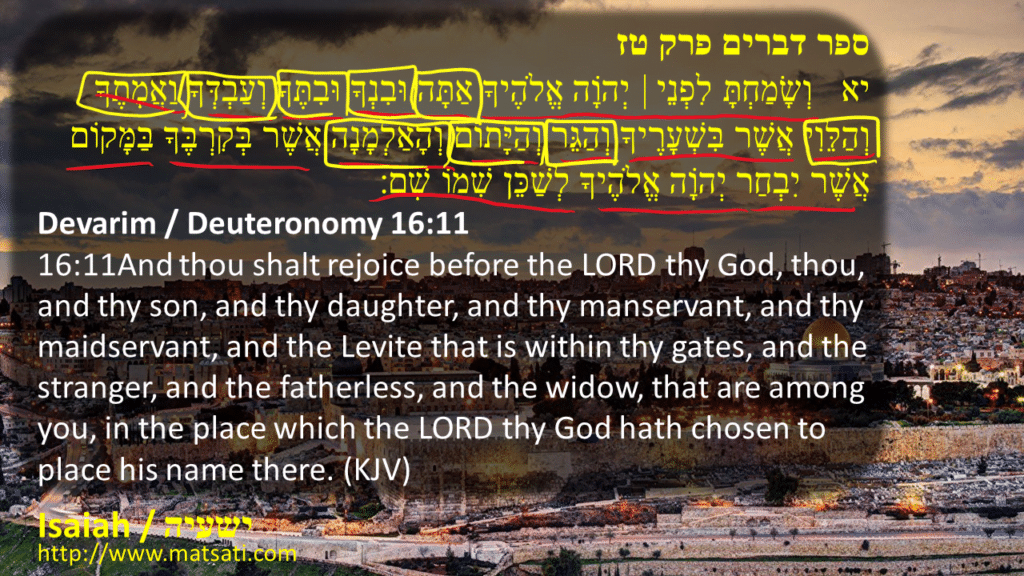
ספר דברים פרק טז
יא וְשָֹמַחְתָּ לִפְנֵי | יְהוָֹה אֱלֹהֶיךָ אַתָּה וּבִנְךָ וּבִתֶּךָ וְעַבְדְּךָ וַאֲמָתֶךָ וְהַלֵּוִי אֲשֶׁר בִּשְׁעָרֶיךָ וְהַגֵּר וְהַיָּתוֹם וְהָאַלְמָנָה אֲשֶׁר בְּקִרְבֶּךָ בַּמָּקוֹם אֲשֶׁר יִבְחַר יְהוָֹה אֱלֹהֶיךָ לְשַׁכֵּן שְׁמוֹ שָׁם:
Devarim / Deuteronomy 16:11
16:11And thou shalt rejoice before the LORD thy God, thou, and thy son, and thy daughter, and thy manservant, and thy maidservant, and the Levite that is within thy gates, and the stranger, and the fatherless, and the widow, that are among you, in the place which the LORD thy God hath chosen to place his name there. (KJV)
The Torah describes the joy of the Lord, how the ways of God are a thing of rejoicing, freedom, peace, and great happiness. This is how the leaders should be guiding the people, directing them to God’s Holy Word and choosing to walk in His ways! The way this is accomplished is through compassion and mercy which are illustrated in taking care of the widow and the orphan. The atnakh separates the verse at this phrase בְּכָל־פֶּ֑ה בְּכָל־זֹאת֙ לֹא־שָׁ֣ב אַפּ֔וֹ וְע֖וֹד יָד֥וֹ נְטוּיָֽה “and every mouth speaketh folly. For all this his anger is not turned away, but his hand is stretched out still” speaking to the foolishness of the leaders who reject the reality of their situation. (see Bereshit / Genesis 34:7, Joshua 7:15, Judges 19:24) There are so many parallels here in today’s culture. This kind of attitude again is rooted in pride and selfishness and prevents one from turning to the Lord and seeking His holy and righteous ways. The outstretched hand remains upon such people who refuse to humble themselves, listen, and obey! We remember that sin consumes from within to destroy, which then seeps out to be revealed for all to see. Sin is contrary to God’s purpose and plan for our lives. This is why it is so important to remain in God’s Word, as the Torah and all of Scripture reveals to us our sins (read Romans 2) and is the reason we see the continual theme throughout the Scriptures of a call to repent, to turn from our ways and to walk in God’s Ways! Note the Lord does not leave us alone to do this by ourselves. He promises to dwell in our midst, to fill us with His Holy Spirit, to empower us to overcome, and to cause us to have ever increasing faith and faithfulness, if we are willing to humble ourselves and seek the author of our faith, our Father in heaven and Yeshua the Messiah!
ספר ישעיה פרק ט
יז כִּי-בָעֲרָה כָאֵשׁ רִשְׁעָה שָׁמִיר וָשַׁיִת תֹּאכֵל וַתִּצַּת בְּסִבְכֵי הַיַּעַר וַיִּתְאַבְּכוּ גֵּאוּת עָשָׁן:
Isaiah 9:18 states, “For wickedness burneth as the fire: (כִּי-בָעֲרָה כָאֵשׁ רִשְׁעָה) it shall devour the briers and thorns, (שָׁמִיר וָשַׁיִת תֹּאכֵל) and shall kindle in the thickets of the forest, (וַתִּצַּת בְּסִבְכֵי הַיַּעַ) and they shall mount up like the lifting up of smoke. (וַיִּתְאַבְּכוּ גֵּאוּת עָשָׁן)” These words remind us of Tehillim / Psalms 32 and Ezekiel 28.
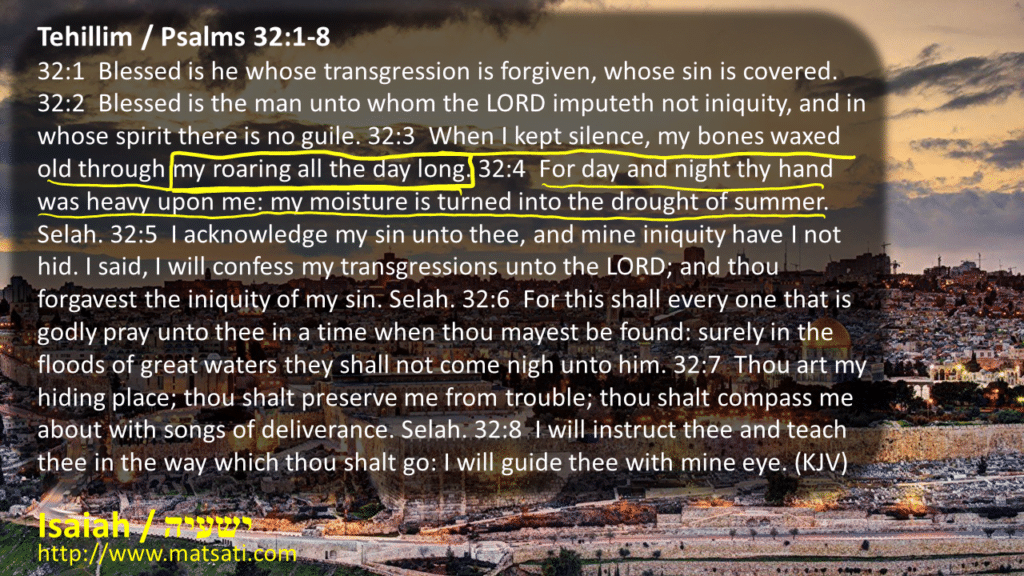
ספר תהילים פרק לב
א לְדָוִד מַשְֹכִּיל אַשְׁרֵי נְשֹוּי-פֶּשַׁע כְּסוּי חֲטָאָה: ב אַשְׁרֵי אָדָם לֹא יַחְשֹׁב יְהֹוָה לוֹ עָוֹן וְאֵין בְּרוּחוֹ רְמִיָּה: ג כִּי הֶחֱרַשְׁתִּי בָּלוּ עֲצָמָי בְּשַׁאֲגָתִי כָּל-הַיּוֹם: ד כִּי | יוֹמָם וָלַיְלָה | תִּכְבַּד עָלַי יָדֶךָ נֶהְפַּךְ לְשַׁדִּי בְּחַרְבֹנֵי קַיִץ סֶלָה: ה חַטָּאתִי אוֹדִיעֲךָ וַעֲוֹנִי לֹא-כִסִּיתִי אָמַרְתִּי אוֹדֶה עֲלֵי פְשָׁעַי לַיהֹוָה וְאַתָּה נָשָֹאתָ עֲוֹן חַטָּאתִי סֶלָה: ו עַל-זֹאת יִתְפַּלֵּל כָּל-חָסִיד | אֵלֶיךָ לְעֵת מְצֹא רַק לְשֵׁטֶף מַיִם רַבִּים אֵלָיו לֹא יַגִּיעוּ: ז אַתָּה | סֵתֶר לִי מִצַּר תִּצְּרֵנִי רָנֵּי פַלֵּט תְּסוֹבְבֵנִי סֶלָה: ח אַשְֹכִּילְךָ | וְאוֹרְךָ בְּדֶרֶךְ-זוּ תֵלֵךְ אִיעֲצָה עָלֶיךָ עֵינִי:
Tehillim / Psalms 32:1-8
32:1 Blessed is he whose transgression is forgiven, whose sin is covered. 32:2 Blessed is the man unto whom the LORD imputeth not iniquity, and in whose spirit there is no guile. 32:3 When I kept silence, my bones waxed old through my roaring all the day long. 32:4 For day and night thy hand was heavy upon me: my moisture is turned into the drought of summer. Selah. 32:5 I acknowledge my sin unto thee, and mine iniquity have I not hid. I said, I will confess my transgressions unto the LORD; and thou forgavest the iniquity of my sin. Selah. 32:6 For this shall every one that is godly pray unto thee in a time when thou mayest be found: surely in the floods of great waters they shall not come nigh unto him. 32:7 Thou art my hiding place; thou shalt preserve me from trouble; thou shalt compass me about with songs of deliverance. Selah. 32:8 I will instruct thee and teach thee in the way which thou shalt go: I will guide thee with mine eye. (KJV)
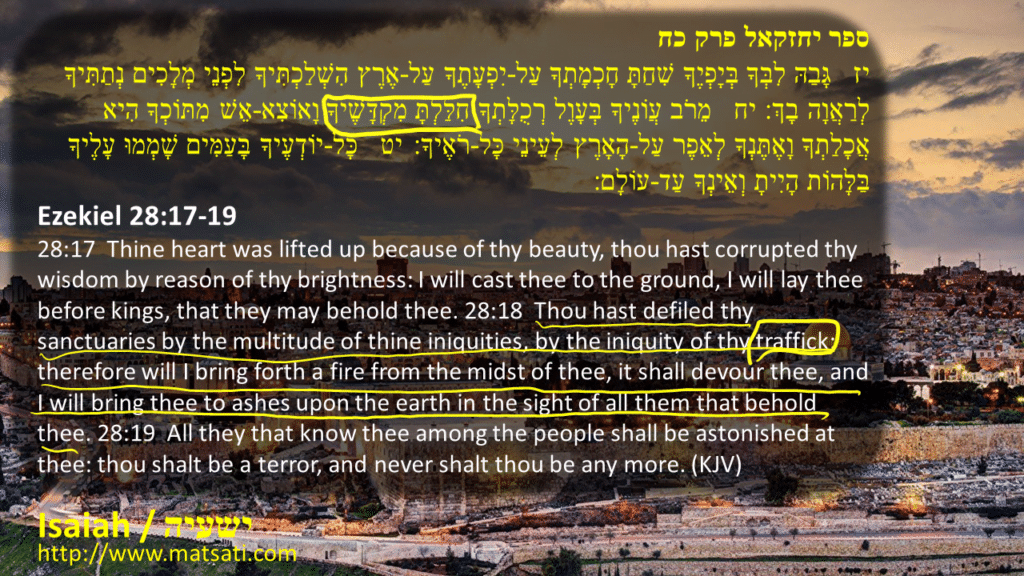
ספר יחזקאל פרק כח
יז גָּבַהּ לִבְּךָ בְּיָפְיֶךָ שִׁחַתָּ חָכְמָתְךָ עַל-יִפְעָתֶךָ עַל-אֶרֶץ הִשְׁלַכְתִּיךָ לִפְנֵי מְלָכִים נְתַתִּיךָ לְרַאֲוָה בָךְ: יח מֵרֹב עֲוֹנֶיךָ בְּעָוֶל רְכֻלָּתְךָ חִלַּלְתָּ מִקְדָּשֶׁיךָ וָאוֹצִא-אֵשׁ מִתּוֹכְךָ הִיא אֲכָלַתְךָ וָאֶתֶּנְךָ לְאֵפֶר עַל-הָאָרֶץ לְעֵינֵי כָּל-רֹאֶיךָ: יט כָּל-יוֹדְעֶיךָ בָּעַמִּים שָׁמְמוּ עָלֶיךָ בַּלָּהוֹת הָיִיתָ וְאֵינְךָ עַד-עוֹלָם:
Ezekiel 28:17-19
28:17 Thine heart was lifted up because of thy beauty, thou hast corrupted thy wisdom by reason of thy brightness: I will cast thee to the ground, I will lay thee before kings, that they may behold thee. 28:18 Thou hast defiled thy sanctuaries by the multitude of thine iniquities, by the iniquity of thy traffick; therefore will I bring forth a fire from the midst of thee, it shall devour thee, and I will bring thee to ashes upon the earth in the sight of all them that behold thee. 28:19 All they that know thee among the people shall be astonished at thee: thou shalt be a terror, and never shalt thou be any more. (KJV)
David wrote ג כִּי הֶחֱרַשְׁתִּי בָּלוּ עֲצָמָי בְּשַׁאֲגָתִי כָּל-הַיּוֹם: ד כִּי | יוֹמָם וָלַיְלָה | תִּכְבַּד עָלַי יָדֶךָ נֶהְפַּךְ לְשַׁדִּי בְּחַרְבֹנֵי קַיִץ סֶלָה: 32:3 When I kept silence, my bones waxed old through my roaring all the day long. 32:4 For day and night thy hand was heavy upon me: my moisture is turned into the drought of summer. Selah. (KJV) speaking of the state of the inside, how sin brought a lack of peace. Ezekiel draws out the narrative that Isaiah is speaking of, that pride has caused corruption and the people’s iniquity has led to the defilement of the sanctuaries. The idea here מֵרֹ֣ב עֲוֺנֶ֗יךָ בְּעֶ֙וֶל֙ רְכֻלָּ֣תְךָ֔ חִלַּ֖לְתָּ מִקְדָּשֶׁ֑יךָ “the multitude of your iniquities by the work of your trade, you have defiled your sanctuaries,” note that מִקְדָּשֶׁ֑יךָ (your sanctuaries) is a noun, common, ms plural construct form. When Ezekiel speaks of “sanctuaries” what is he referring to when we consider that there is only one sanctuary of God in the Mishkhan (Tabernacle)? We remember that the Torah speaks of the sanctuary cities of refuge, of the Tabernacle, and of the home being a sanctuary, and the dinner table as being the table of fellowship before God. The Mikdash is derived from the root word for “holy,” which implies a distinction between space that is “sacred” versus “profane” and this is commonly referred to as the place of worship, “sanctuary” (Shemot / Exodus 25:8) Because of their sins, the Lord says through Isaiah, וָֽאוֹצִא־אֵ֤שׁ מִתּֽוֹכְךָ֙ הִ֣יא אֲכָלַ֔תְךָ וָאֶתֶּנְךָ֤ לְאֵ֙פֶר֙ עַל־הָאָ֔רֶץ לְעֵינֵ֖י כָּל־רֹאֶֽיךָ׃ “therefore will I bring forth a fire from the midst of thee, it shall devour thee, and I will bring thee to ashes upon the earth in the sight of all them that behold thee.” These concepts tend to draw out what Isaiah is saying in 19:8, “For wickedness burneth as the fire: (כִּי-בָעֲרָה כָאֵשׁ רִשְׁעָה) it shall devour the briers and thorns, (שָׁמִיר וָשַׁיִת תֹּאכֵל) and shall kindle in the thickets of the forest, (וַתִּצַּת בְּסִבְכֵי הַיַּעַ) and they shall mount up like the lifting up of smoke. (וַיִּתְאַבְּכוּ גֵּאוּת עָשָׁן)” Here Isaiah describes sin as a consuming fire that devours. Sin is destructive, consuming, and lays waste to the one who practices it from the inside out. Sin requires ever increasing levels of self-gratification, and the act in the body itself does not satisfy, therefore the end outcome is nothing but a raging fire of rebellion to the God in heaven who calls us to His ways of peace, life, and truth.
ספר ישעיה פרק ט
יח בְּעֶבְרַת יְהֹוָה צְבָאוֹת נֶעְתַּם אָרֶץ וַיְהִי הָעָם כְּמַאֲכֹלֶת אֵשׁ אִישׁ אֶל-אָחִיו לֹא יַחְמֹלוּ:
Isaiah 9:19 states, “Through the wrath of the LORD of hosts is the land darkened, (בְּעֶבְרַת יְהֹוָה צְבָאוֹת נֶעְתַּם אָרֶץ) and the people shall be as the fuel of the fire: (וַיְהִי הָעָם כְּמַאֲכֹלֶת אֵשׁ) no man shall spare his brother. (אִישׁ אֶל-אָחִיו לֹא יַחְמֹלוּ)” These things speak to the Torah
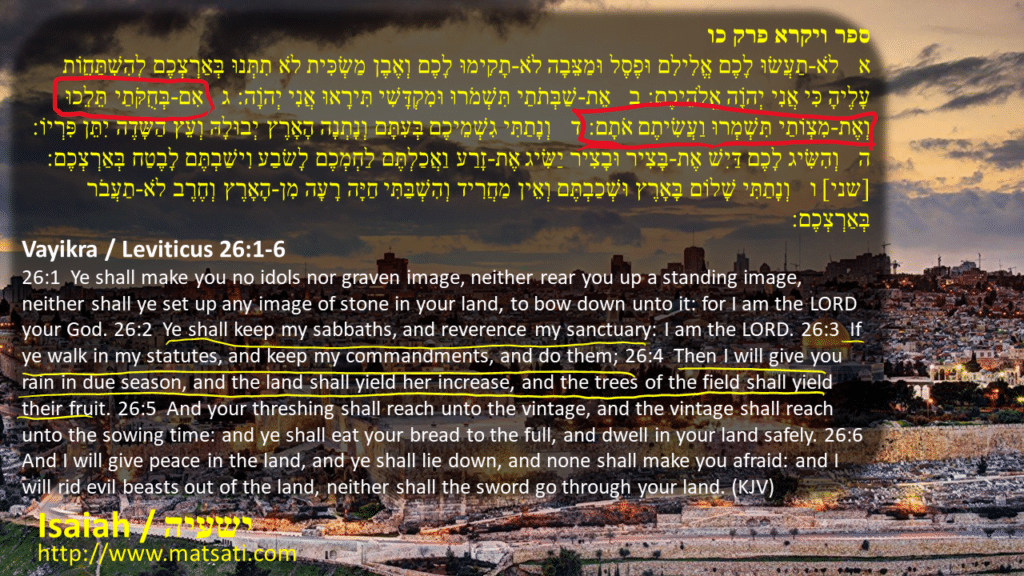
ספר ויקרא פרק כו
א לֹא-תַעֲשֹוּ לָכֶם אֱלִילִם וּפֶסֶל וּמַצֵּבָה לֹא-תָקִימוּ לָכֶם וְאֶבֶן מַשְֹכִּית לֹא תִתְּנוּ בְּאַרְצְכֶם לְהִשְׁתַּחֲוֹת עָלֶיהָ כִּי אֲנִי יְהוָֹה אֱלֹהֵיכֶם: ב אֶת-שַׁבְּתֹתַי תִּשְׁמֹרוּ וּמִקְדָּשִׁי תִּירָאוּ אֲנִי יְהוָֹה: פ פ פ [פרשת בחקותי] ג אִם-בְּחֻקֹּתַי תֵּלֵכוּ וְאֶת-מִצְוֹתַי תִּשְׁמְרוּ וַעֲשִֹיתֶם אֹתָם: ד וְנָתַתִּי גִשְׁמֵיכֶם בְּעִתָּם וְנָתְנָה הָאָרֶץ יְבוּלָהּ וְעֵץ הַשָּׂדֶה יִתֵּן פִּרְיוֹ: ה וְהִשִּׂיג לָכֶם דַּיִשׁ אֶת-בָּצִיר וּבָצִיר יַשִּׂיג אֶת-זָרַע וַאֲכַלְתֶּם לַחְמְכֶם לָשֹֹבַע וִישַׁבְתֶּם לָבֶטַח בְּאַרְצְכֶם: [שני] ו וְנָתַתִּי שָׁלוֹם בָּאָרֶץ וּשְׁכַבְתֶּם וְאֵין מַחֲרִיד וְהִשְׁבַּתִּי חַיָּה רָעָה מִן-הָאָרֶץ וְחֶרֶב לֹא-תַעֲבֹר בְּאַרְצְכֶם:
Vayikra / Leviticus 26:1-6
26:1 Ye shall make you no idols nor graven image, neither rear you up a standing image, neither shall ye set up any image of stone in your land, to bow down unto it: for I am the LORD your God. 26:2 Ye shall keep my sabbaths, and reverence my sanctuary: I am the LORD. 26:3 If ye walk in my statutes, and keep my commandments, and do them; 26:4 Then I will give you rain in due season, and the land shall yield her increase, and the trees of the field shall yield their fruit. 26:5 And your threshing shall reach unto the vintage, and the vintage shall reach unto the sowing time: and ye shall eat your bread to the full, and dwell in your land safely. 26:6 And I will give peace in the land, and ye shall lie down, and none shall make you afraid: and I will rid evil beasts out of the land, neither shall the sword go through your land.
Seeking the Lord, walking in His ways, these things lead to God’s blessing, specifically from the sense of וִישַׁבְתֶּם לָבֶטַח בְּאַרְצְכֶם “dwelling in the land securely” meaning that God will cause our enemies to remain in their place. On the other hand, when one does not listen and obey, we read the following according to Vayikra / Leviticus 26:14-17.
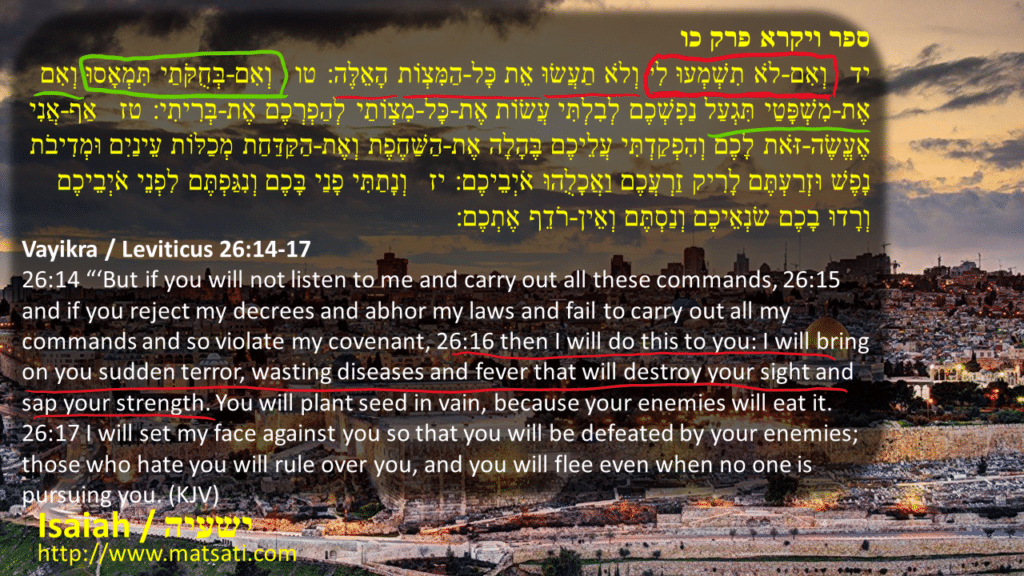
ספר ויקרא פרק כו
יד וְאִם-לֹא תִשְׁמְעוּ לִי וְלֹא תַעֲשֹוּ אֵת כָּל-הַמִּצְוֹת הָאֵלֶּה: טו וְאִם-בְּחֻקֹּתַי תִּמְאָסוּ וְאִם אֶת-מִשְׁפָּטַי תִּגְעַל נַפְשְׁכֶם לְבִלְתִּי עֲשֹוֹת אֶת-כָּל-מִצְוֹתַי לְהַפְרְכֶם אֶת-בְּרִיתִי: טז אַף-אֲנִי אֶעֱשֶֹה-זֹּאת לָכֶם וְהִפְקַדְתִּי עֲלֵיכֶם בֶּהָלָה אֶת-הַשַּׁחֶפֶת וְאֶת-הַקַּדַּחַת מְכַלּוֹת עֵינַיִם וּמְדִיבֹת נָפֶשׁ וּזְרַעְתֶּם לָרִיק זַרְעֲכֶם וַאֲכָלֻהוּ אֹיְבֵיכֶם: יז וְנָתַתִּי פָנַי בָּכֶם וְנִגַּפְתֶּם לִפְנֵי אֹיְבֵיכֶם וְרָדוּ בָכֶם שֹֹנְאֵיכֶם וְנַסְתֶּם וְאֵין-רֹדֵף אֶתְכֶם:
Vayikra / Leviticus 26:14-17
26:14 “‘But if you will not listen to me and carry out all these commands, 26:15 and if you reject my decrees and abhor my laws and fail to carry out all my commands and so violate my covenant, 26:16 then I will do this to you: I will bring on you sudden terror, wasting diseases and fever that will destroy your sight and sap your strength. You will plant seed in vain, because your enemies will eat it. 26:17 I will set my face against you so that you will be defeated by your enemies; those who hate you will rule over you, and you will flee even when no one is pursuing you. (KJV)
We note the outcome of sin is directly related to falling before our enemies. The people if they had been studying the Torah of God, they would know these things. It is the sin itself that has defiled the land, when it was supposed to be holy, sacred, sanctified, and set apart for the Lord. Note that when the Land (analogy for the people who live in the land) was unholy, the nations who are by nature unholy, perceive the land as their own and enter in and take it. The sin causes brother to fight brother, and these things illustrate for us that God has established one way for His people, for life, peace, and truth. All other ways lead to death and destruction!
ספר ישעיה פרק ט
יט וַיִּגְזֹר עַל-יָמִין וְרָעֵב וַיֹּאכַל עַל-שְֹמֹאול וְלֹא שָֹבֵעוּ אִישׁ בְּשַֹר-זְרֹעוֹ יֹאכֵלוּ: כ מְנַשֶּׁה אֶת-אֶפְרַיִם וְאֶפְרַיִם אֶת-מְנַשֶּׁה יַחְדָּו הֵמָּה עַל-יְהוּדָה בְּכָל-זֹאת לֹא-שָׁב אַפּוֹ וְעוֹד יָדוֹ נְטוּיָה:
Isaiah 9:20 states, “And he shall snatch on the right hand, and be hungry; (וַיִּגְזֹר עַל-יָמִין וְרָעֵב) and he shall eat on the left hand, (וַיֹּאכַל עַל-שְֹמֹאול) and they shall not be satisfied: they shall eat every man the flesh of his own arm: (וְלֹא שָֹבֵעוּ אִישׁ בְּשַֹר-זְרֹעוֹ יֹאכֵלוּ)” Isaiah 9:21 “Manasseh, Ephraim; and Ephraim, Manasseh: (מְנַשֶּׁה אֶת-אֶפְרַיִם וְאֶפְרַיִם אֶת-מְנַשֶּׁה) and they together shall be against Judah. (יַחְדָּו הֵמָּה עַל-יְהוּדָה) For all this his anger is not turned away, but his hand is stretched out still. (בְּכָל-זֹאת לֹא-שָׁב אַפּוֹ וְעוֹד יָדוֹ נְטוּיָה)” Isaiah continues to illustrate these Torah concepts as he ends chapter 9. Sin devours and destroys lives. Note the אִישׁ אֶל-אָחִיו לֹא יַחְמֹלוּ “no man will spare his brother” illustrates the capacity of sin to destroy relationships. This is the nature of selfishness, pride, and arrogance, as opposed to the servant attitude. These things are illustrated in the words מְנַשֶּׁה אֶת-אֶפְרַיִם וְאֶפְרַיִם אֶת-מְנַשֶּׁה יַחְדָּו הֵמָּה עַל-יְהוּדָה בְּכָל-זֹאת לֹא-שָׁב אַפּוֹ וְעוֹד יָדוֹ נְטוּיָה “Manasseh, Ephraim; and Ephraim, Manasseh: and they together shall be against Judah. For all this his anger is not turned away, but his hand is stretched out still.” These things describe sin as tribal hostility, brothers being angry at one another, and the only solution to this is to be changed from the inside out, just as the Lord states through Isaiah that He is sending a fire from within to consume. If we are unwilling to repent and turn from our sins, that fire will leave nothing but ashes. If we repent and turn from our sin, that fire will refine and purify. The specific NT perspective is the need for the Lord God Almighty to enter into our lives to help us to turn from our sins. By faith we receive the Holy Spirit of God who empowers us to overcome this world and sin, because of what Yeshua has done for us, our faith in the Messiah establishes our faith in our Father in heaven, and in His holy Words according to the Scriptures.
Rabbinic Commentary on Isaiah 9:11-20
The Targum Jonathan is a rabbinic interpretation of the book of Isaiah.
תרגום יונתן בן עוזיאל אל ישעיה פרק ט:יא-כ
י וְתַקֵיף יוי יָת סָנְאֵיה דְיִשׂרָאֵל רְצִין עְלֹוהִי וְיָת בַעְלֵי דְבָבֹוהִי יְעָרַר׃ יא אְרָם מִמַדנְחָא וּפלִשתָאֵי מִמַערְבָא וּבַזוּ יָת נִכסֵי יִשׂרָאֵל בְכָל אְתַר בְכָל דָא לָא תָבוּ מֵחֹובֵיהֹון דִיתוּב רוּגזֵיה מִנְהֹון וְעַד כְעַן מְתַקְפִין מִרדֵיהֹון וְעֹוד מַחְתֵיה עְתִידָא לְאִתפְרָעָא מִנְהֹון׃ יב וְעַמָא לָא תָבוּ לְפוּלחַן מַן דְאַיתִי עְלֵיהֹון מַחָא וְאוּלפָן מִן קֳדָם יוי צְבָאֹות לָא תְבַעוּ׃ יג וְשֵיצִי יוי מִיִשׂרָאֵל רֵיש וְהַגמֹון שִלטֹון וְאִטְרֹון יֹומָא חַד׃ יד סָב וְנסִיב אַפִין הוּא רֵישָא וְסָפַר מַלֵיף שְקַר הוּא חַלָשָא׃ טו וַהְוֹו מְשַבְחֵיה דְעַמָא הָדֵין מַטעַן וְרַברְבֹוהִי מְסַלעְמִין׃ טז עַל כֵין עַל עוּלֹומֹוהִי לָא יִחדֵי יוי וְעַל יַתמֹוהִי וְעַל אַרמְלָתֵיה לָא יְרַחֵים אְרֵי כוּלְהֹון חָנְפִין וּבִישִין וְכָל פוּמְהֹון מְמַלְלִין שְקַר בְכָל דָא לָא תָבוּ מֵחֹובֵיהֹון דִיתוּב רוּגזֵיה מִנְהֹון וְעַד כְעַן מְתַקְפִין מִרדֵיהֹון וְעֹוד מַחְתֵיה עְתִידָא לְאִתפְרָעָא מִינְהֹון׃ יז אְרֵי תִדלַק כְאִישָתָא פֹורעָנוּת חֹובֵיהֹון חַטָאַיָא וְחַייָבַיָא תְשֵיצֵי וְתִשלֹוט בִשאָר עַמָא וּתשֵיצֵי סְגֵי מַשרְיָתָא׃ יח בְתַעְבוּר מִן קֻדם יוי צְבָאֹות חְרֹובַת אַרעָא וַהְוָה עַמָא כִיקֵידַת נוּר גְבַר עַל אְחוּהִי לָא חָייְסִין׃ יט וּבַז מִן דָרֹומָא וּכפֵין וְשֵיצִי מִן צִיפוּנָא וְלָא סְבַע גְבַר נִכסֵי קָרִיבֵיה יִבְזוּן׃ כ דְבֵית מְנַשַה עִם דְבֵית אַפרַיִם וּדבֵית אַפרַיִם עִם דְבֵית מְנַשַה כַחדָא יִתחַבְרוּן לְמֵיתֵי עַל דְבֵית יְהוּדָה בְכָל דָא לָא תָבוּ מֵחֹובֵיהֹון דִיתוּב רוּגזֵיה מִינְהֹון וְעַד כְעַן מְתַקְפִין מִרדֵיהֹון וְעֹוד מַחְתֵיה עְתִידָא לְאִתפְרָעָא מִנְהֹון׃
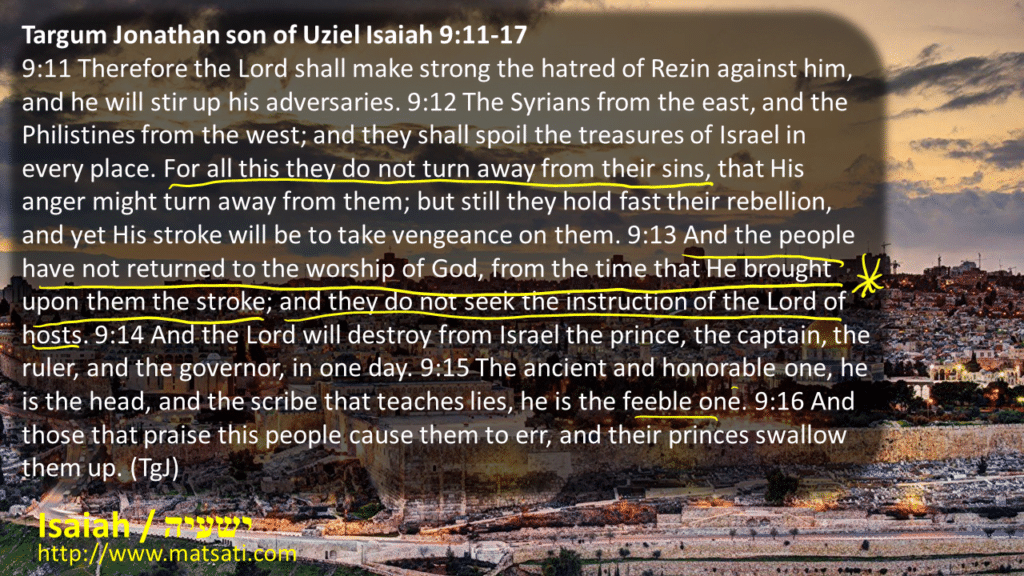
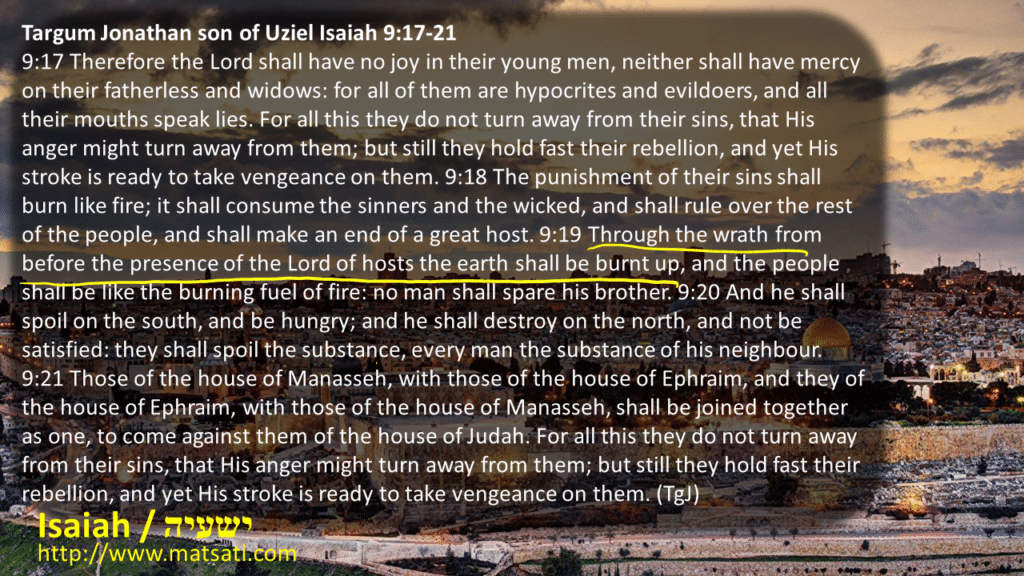
Targum Jonathan son of Uziel Isaiah 9:11-21
9:11 Therefore the Lord shall make strong the hatred of Rezin against him, and he will stir up his adversaries. 9:12 The Syrians from the east, and the Philistines from the west; and they shall spoil the treasures of Israel in every place. For all this they do not turn away from their sins, that His anger might turn away from them; but still they hold fast their rebellion, and yet His stroke will be to take vengeance on them. 9:13 And the people have not returned to the worship of God, from the time that He brought upon them the stroke; and they do not seek the instruction of the Lord of hosts. 9:14 And the Lord will destroy from Israel the prince, the captain, the ruler, and the governor, in one day. 9:15 The ancient and honorable one, he is the head, and the scribe that teaches lies, he is the feeble one. 9:16 And those that praise this people cause them to err, and their princes swallow them up. 9:17 Therefore the Lord shall have no joy in their young men, neither shall have mercy on their fatherless and widows: for all of them are hypocrites and evildoers, and all their mouths speak lies. For all this they do not turn away from their sins, that His anger might turn away from them; but still they hold fast their rebellion, and yet His stroke is ready to take vengeance on them. 9:18 The punishment of their sins shall burn like fire; it shall consume the sinners and the wicked, and shall rule over the rest of the people, and shall make an end of a great host. 9:19 Through the wrath from before the presence of the Lord of hosts the earth shall be burnt up, and the people shall be like the burning fuel of fire: no man shall spare his brother. 9:20 And he shall spoil on the south, and be hungry; and he shall destroy on the north, and not be satisfied: they shall spoil the substance, every man the substance of his neighbour. 9:21 Those of the house of Manasseh, with those of the house of Ephraim, and they of the house of Ephraim, with those of the house of Manasseh, shall be joined together as one, to come against them of the house of Judah. For all this they do not turn away from their sins, that His anger might turn away from them; but still they hold fast their rebellion, and yet His stroke is ready to take vengeance on them. (TgJ)
The TgJ translates Isaiah’s words to say, י וְתַקֵיף יוי יָת סָנְאֵיה דְיִשׂרָאֵל רְצִין עְלֹוהִי וְיָת בַעְלֵי דְבָבֹוהִי יְעָרַר׃ 9:11 Therefore the Lord shall make strong the hatred of Rezin against him, and he will stir up his adversaries. יא אְרָם מִמַדנְחָא וּפלִשתָאֵי מִמַערְבָא וּבַזוּ יָת נִכסֵי יִשׂרָאֵל בְכָל אְתַר בְכָל דָא לָא תָבוּ מֵחֹובֵיהֹון דִיתוּב רוּגזֵיה מִנְהֹון וְעַד כְעַן מְתַקְפִין מִרדֵיהֹון וְעֹוד מַחְתֵיה עְתִידָא לְאִתפְרָעָא מִנְהֹון׃ 9:12 The Syrians from the east, and the Philistines from the west; and they shall spoil the treasures of Israel in every place. For all this they do not turn away from their sins, that His anger might turn away from them; but still they hold fast their rebellion, and yet His stroke will be to take vengeance on them. (TgJ) Based upon the Targum and the MSS, the Lord God Almighty has a hand in what is taking place against Israel due to her sins. King Solomon states the following according to Ecclesiastes 9:1-2.
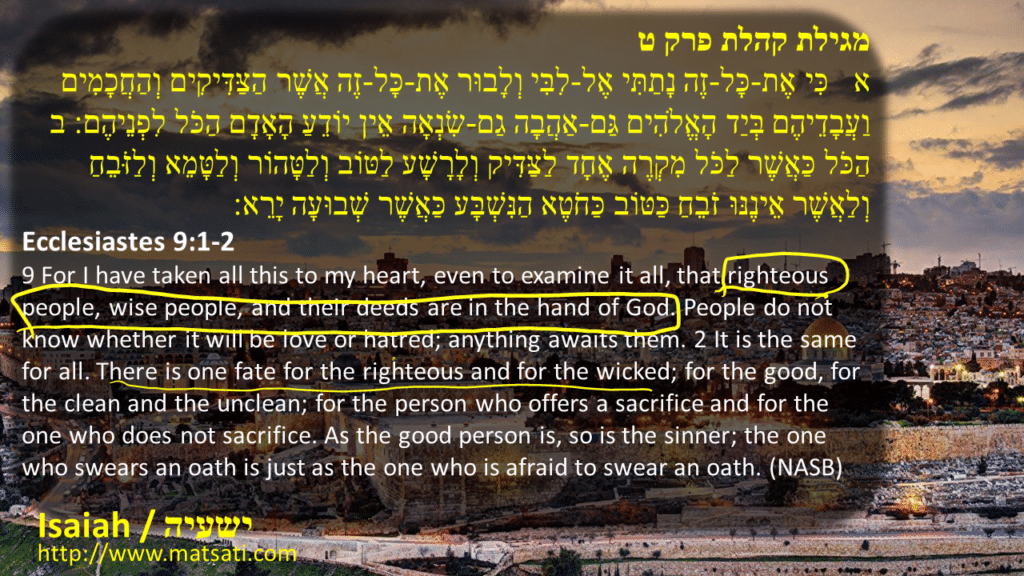
מגילת קהלת פרק ט
א כִּי אֶת-כָּל-זֶה נָתַתִּי אֶל-לִבִּי וְלָבוּר אֶת-כָּל-זֶה אֲשֶׁר הַצַּדִּיקִים וְהַחֲכָמִים וַעֲבָדֵיהֶם בְּיַד הָאֱלֹהִים גַּם-אַהֲבָה גַם-שִֹנְאָה אֵין יוֹדֵעַ הָאָדָם הַכֹּל לִפְנֵיהֶם: ב הַכֹּל כַּאֲשֶׁר לַכֹּל מִקְרֶה אֶחָד לַצַּדִּיק וְלָרָשָׁע לַטּוֹב וְלַטָּהוֹר וְלַטָּמֵא וְלַזֹּבֵחַ וְלַאֲשֶׁר אֵינֶנּוּ זֹבֵחַ כַּטּוֹב כַּחֹטֶא הַנִּשְׁבָּע כַּאֲשֶׁר שְׁבוּעָה יָרֵא:
Ecclesiastes 9:1-2
9 For I have taken all this to my heart, even to examine it all, that righteous people, wise people, and their deeds are in the hand of God. People do not know whether it will be love or hatred; anything awaits them. 2 It is the same for all. There is one fate for the righteous and for the wicked; for the good, for the clean and the unclean; for the person who offers a sacrifice and for the one who does not sacrifice. As the good person is, so is the sinner; the one who swears an oath is just as the one who is afraid to swear an oath. (NASB)
Solomon says, הַצַּדִּיקִים וְהַחֲכָמִים וַעֲבָדֵיהֶם בְּיַד הָאֱלֹהִים “the righteous and the wise, their works are in the hand of God.” We note here that according to Isaiah, even the works of the wicked can be a function of the Lord’s influence upon the heart of men. Isaiah says that the Lord strengthened the hatred of Rezin against Israel, even the Syrians from the east and the Philistines from the west. Rashi interprets these things in the following way:

Rashi on Isaiah.9.12 9.12 Part 1
עד המכהו. עד הקב”ה שהוא מביא עליו המכו’ האלה:
to the One Who smites it To the Holy One, blessed be He, Who brings these afflictions upon them.
Rashi believes that it is the Lord God who brings afflictions upon sinners. We note that today there is a belief that the God in the OT is different from the God in the NT. This generally comes from a superficial understanding and knowledge of the Scriptures. Generally speaking, not knowing the details leads to one believing the Lord is all about punishing the wicked, whereas in the NT Yeshua appears kind, loving, meek, and forgiving. The major point concerning the Tanakh is that God in His mercy was sending prophets to call the people to repentance and to turn from their sin, to return to faith and faithfulness to the God in heaven, the creator, the one who delivered them. At one point, when the people fail to do what John writes in 1 John 2, eventually the Lord will begin to work in the people’s lives to help them remember the Word of God.
1 John 2:1-7
2:1 My little children, these things write I unto you, that ye sin not. And if any man sin, we have an advocate with the Father, Jesus Christ the righteous: 2:2 And he is the propitiation for our sins: and not for our’s only, but also for the sins of the whole world. 2:3 And hereby we do know that we know him, if we keep his commandments. 2:4 He that saith, I know him, and keepeth not his commandments, is a liar, and the truth is not in him. 2:5 But whoso keepeth his word, in him verily is the love of God perfected: hereby know we that we are in him. 2:6 He that saith he abideth in him ought himself also so to walk, even as he walked. 2:7 Brethren, I write no new commandment unto you, but an old commandment which ye had from the beginning. The old commandment is the word which ye have heard from the beginning. (KJV)
We note that the commands of God are relevant for our lives today according to John, as much as they were relevant to the people of Israel, Judah, and Jerusalem back in the time of Isaiah. John says that we do not know the Father in heaven if we are not keeping His commands. In addition to this, while reading the NT account, we learn how Yeshua raised the bar on obeying the Torah of God. John says that we are supposed to walk as Yeshua walked. The real question is what would happen to those who choose to not walk as Yeshua walked? Or refuse to obey God’s commands as John is saying here in 1 John 2:1-7? If one chooses to walk in rebellion, but say he or she knows Yeshua, the very same things that happened to Israel will befall the one who does this. Note that we can find similar scripture throughout all of the epistles of Peter and John.
Isaiah continues saying, יב וְעַמָא לָא תָבוּ לְפוּלחַן מַן דְאַיתִי עְלֵיהֹון מַחָא וְאוּלפָן מִן קֳדָם יוי צְבָאֹות לָא תְבַעוּ׃ 9:13 And the people have not returned to the worship of God, from the time that He brought upon them the stroke; and they do not seek the instruction of the Lord of hosts. (TgJ) One of the things that all of Scripture is revealing to us is how we need to be intentional in our walk with God, to seek Him, and to bring glory to His name, etc. Here Isaiah states, יג וַיַּכְרֵת יְהֹוָה מִיִּשְֹרָאֵל רֹאשׁ וְזָנָב כִּפָּה וְאַגְמוֹן יוֹם אֶחָד: “Therefore the LORD will cut off from Israel head and tail, (וַיַּכְרֵת יְהֹוָה מִיִּשְֹרָאֵל רֹאשׁ וְזָנָב) branch and rush, in one day. (כִּפָּה וְאַגְמוֹן יוֹם אֶחָד).” Rashi focuses upon the word וְאַגְמוֹן meaning “reed, bulrush” describing the rush as the wind blows causing it to arch over or bend in the blowing wind.
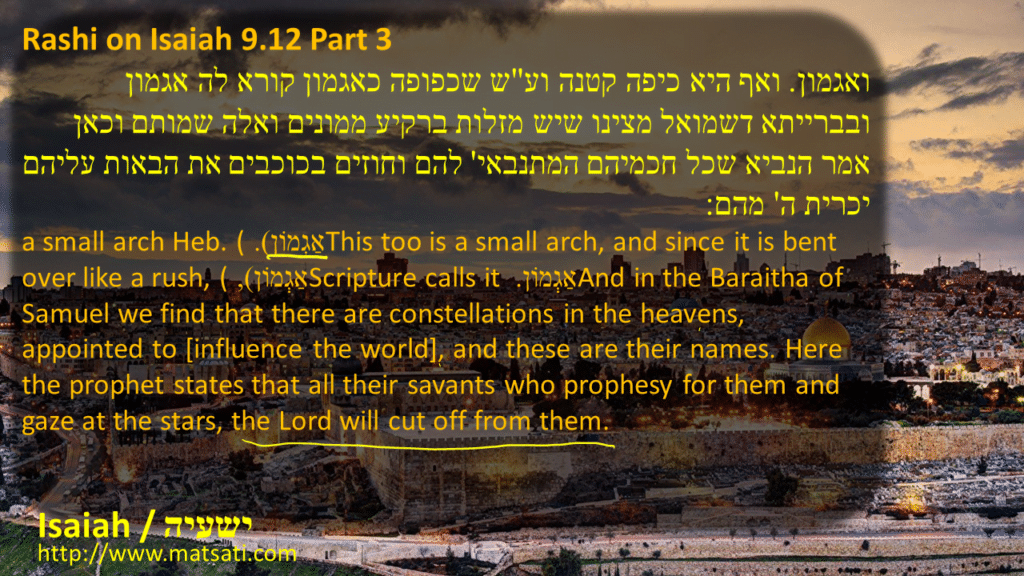
Rashi on Isaiah 9.12 Part 3
ואגמון. ואף היא כיפה קטנה וע”ש שכפופה כאגמון קורא לה אגמון ובברייתא דשמואל מצינו שיש מזלות ברקיע ממונים ואלה שמותם וכאן אמר הנביא שכל חכמיהם המתנבאי’ להם וחוזים בכוכבים את הבאות עליהם יכרית ה’ מהם:
a small arch Heb. (אַגְמוֹן). This too is a small arch, and since it is bent over like a rush, (אַגְמוֹן), Scripture calls it אַגְמוֹן. And in the Baraitha of Samuel we find that there are constellations in the heavens, appointed to [influence the world], and these are their names. Here the prophet states that all their savants who prophesy for them and gaze at the stars, the Lord will cut off from them.
Rashi describes the אַגְמוֹן as illustrating the unseen influence of the wind upon the rush, causing the reed to bend, a parallel is made to the constellations in the heavens and the people who seek the constellations as opposed to seeking the Lord God in heaven. The concept being drawn out here is to what is unseen and influencing the world. As we have been studying here, the Lord God acts as an unseen force moving in this world, in the hearts of men, for the purpose of drawing men to Himself. The TgJ speaks to these things, saying “the people have not returned to the worship of God, from the time that He brought upon them the stroke; and they do not seek the instruction of the Lord of hosts.” These things remind us that the trials and tribulations that we go through are meant for us to draw near and to seek the Lord.
Isaiah continues saying, יג וְשֵיצִי יוי מִיִשׂרָאֵל רֵיש וְהַגמֹון שִלטֹון וְאִטְרֹון יֹומָא חַד׃ 9:14 And the Lord will destroy from Israel the prince, the captain, the ruler, and the governor, in one day. יד סָב וְנסִיב אַפִין הוּא רֵישָא וְסָפַר מַלֵיף שְקַר הוּא חַלָשָא׃ 9:15 The ancient and honorable one, he is the head, and the scribe that teaches lies, he is the feeble one. טו וַהְוֹו מְשַבְחֵיה דְעַמָא הָדֵין מַטעַן וְרַברְבֹוהִי מְסַלעְמִין׃ 9:16 And those that praise this people cause them to err, and their princes swallow them up. (TgJ) The TgJ translates Isaiah to remind us to be careful whom we follow, since it is possible to learn the ways of a false leader. This is how Rashi understands the words of Isaiah.
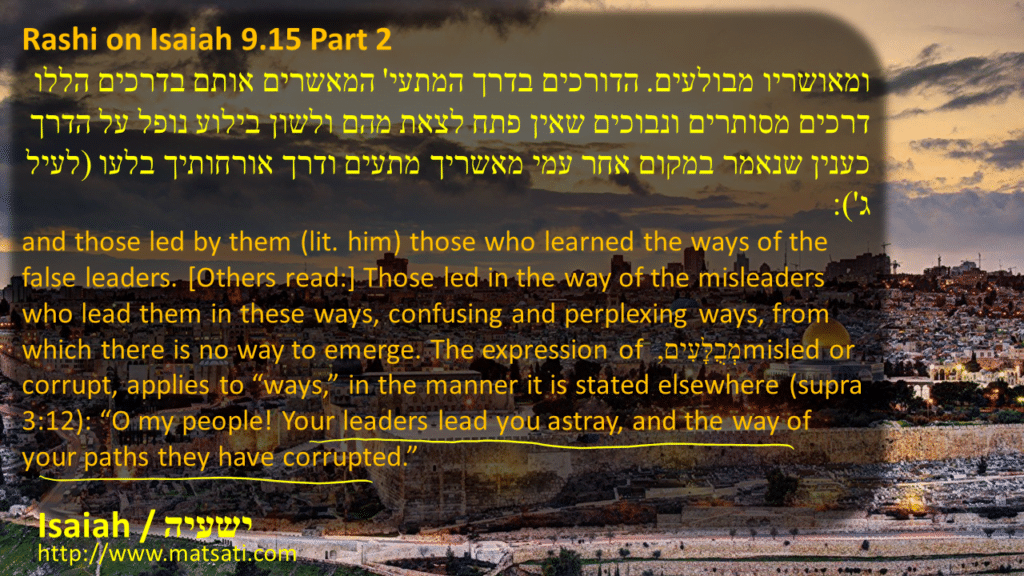
Rashi on Isaiah 9.15 Part 2
ומאושריו מבולעים. הדורכים בדרך המתעי’ המאשרים אותם בדרכים הללו דרכים מסותרים ונבוכים שאין פתח לצאת מהם ולשון בילוע נופל על הדרך כענין שנאמר במקום אחר עמי מאשריך מתעים ודרך אורחותיך בלעו (לעיל ג’):
and those led by them (lit. him) those who learned the ways of the false leaders. [Others read:] Those led in the way of the misleaders who lead them in these ways, confusing and perplexing ways, from which there is no way to emerge. The expression of מְבֻלָּעִים, misled or corrupt, applies to “ways,” in the manner it is stated elsewhere (supra 3:12): “O my people! Your leaders lead you astray, and the way of your paths they have corrupted.”
Corruption is a state of disobedience to God’s word, and it is also a description of moral decay. The Torah reveals to us that the Lord God told Adam that, if he ate from the tree of the knowledge of good and evil, he would “surely die” (Bereshit / Genesis 2:17). Both Adam and Eve ate from the tree, but they didn’t die physically. This act of disobedience led to separation from God which is described as death. Paul wrote, according to his Epistle to the Galatians, “For the one who sows to his own flesh will from the flesh reap corruption, but the one who sows to the Spirit will from the Spirit reap eternal life.” (Galatians 6:8) The point is that sinful behavior can be learned. Sewing to the Spirit and seeking the Lord, these things can be learned, this is why the Lord God preserved for us His word and sent His son Yeshua into this world to show us how to walk in the ways of God.
Isaiah continues saying, טז עַל כֵין עַל עוּלֹומֹוהִי לָא יִחדֵי יוי וְעַל יַתמֹוהִי וְעַל אַרמְלָתֵיה לָא יְרַחֵים אְרֵי כוּלְהֹון חָנְפִין וּבִישִין וְכָל פוּמְהֹון מְמַלְלִין שְקַר בְכָל דָא לָא תָבוּ מֵחֹובֵיהֹון דִיתוּב רוּגזֵיה מִנְהֹון וְעַד כְעַן מְתַקְפִין מִרדֵיהֹון וְעֹוד מַחְתֵיה עְתִידָא לְאִתפְרָעָא מִינְהֹון׃ 9:17 Therefore the Lord shall have no joy in their young men, neither shall have mercy on their fatherless and widows: for all of them are hypocrites and evildoers, and all their mouths speak lies. For all this they do not turn away from their sins, that His anger might turn away from them; but still they hold fast their rebellion, and yet His stroke is ready to take vengeance on them. יז אְרֵי תִדלַק כְאִישָתָא פֹורעָנוּת חֹובֵיהֹון חַטָאַיָא וְחַייָבַיָא תְשֵיצֵי וְתִשלֹוט בִשאָר עַמָא וּתשֵיצֵי סְגֵי מַשרְיָתָא׃ 9:18 The punishment of their sins shall burn like fire; it shall consume the sinners and the wicked, and shall rule over the rest of the people, and shall make an end of a great host. (TgJ) We note what the Torah states, כָּל־אַלְמָנָ֥ה וְיָת֖וֹם לֹ֥א תְעַנּֽוּן “You shall not cause pain to any widow or orphan.” (Shemot / Exodus 22:21) The Torah admonishes us to be particularly sensitive to the needs of a widow or orphan, to be conscious of their pain and their loneliness. This may be due to those who had died during the wilderness journey due to sin. David wrote the following, consistent with the Torah text, in Tehillim / Psalms 68:5, אֲבִ֣י יְ֭תוֹמִים וְדַיַּ֣ן אַלְמָנ֑וֹת אֱ֝לֹהִ֗ים בִּמְע֥וֹן קָדְשֽׁוֹ׃ A father to the fatherless, a defender of widows, is God in his holy dwelling. (NIV) These things speak to being merciful, and how we are to be merciful as God is merciful to us. Jewish thought, Rav Kook, For the Perplexed of the Generation, states the following concerning these verses.
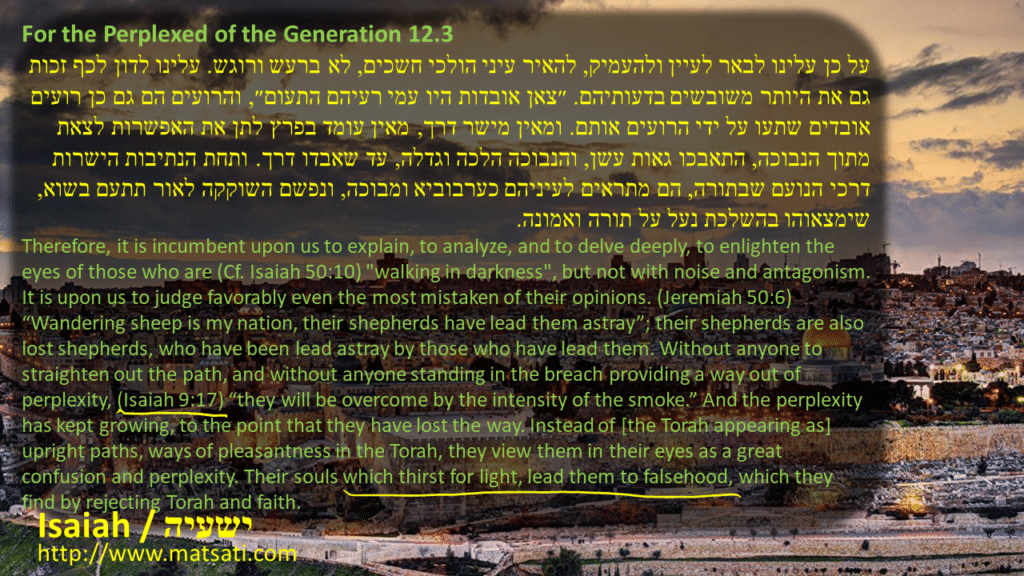
For the Perplexed of the Generation 12.3
על כן עלינו לבאר לעיין ולהעמיק, להאיר עיני הולכי חשכים, לא ברעש ורוגש. עלינו לדון לכף זכות גם את היותר משובשים בדעותיהם. ״צאן אובדות היו עמי רעיהם התעום״, והרועים הם גם כן רועים אובדים שתעו על ידי הרועים אותם. ומאין מישר דרך, מאין עומד בפרץ לתן את האפשרות לצאת מתוך הנבוכה, התאבכו גאות עשן, והנבוכה הלכה וגדלה, עד שאבדו דרך. ותחת הנתיבות הישרות דרכי הנועם שבתורה, הם מתראים לעיניהם כערבוביא ומבוכה, ונפשם השוקקה לאור תתעם בשוא, שימצאוהו בהשלכת נעל על תורה ואמונה.
Therefore, it is incumbent upon us to explain, to analyze, and to delve deeply, to enlighten the eyes of those who are (Cf. Isaiah 50:10) “walking in darkness”, but not with noise and antagonism. It is upon us to judge favorably even the most mistaken of their opinions. (Jeremiah 50:6) “Wandering sheep is my nation, their shepherds have lead them astray”; their shepherds are also lost shepherds, who have been lead astray by those who have lead them. Without anyone to straighten out the path, and without anyone standing in the breach providing a way out of perplexity, (Isaiah 9:17) “they will be overcome by the intensity of the smoke.” And the perplexity has kept growing, to the point that they have lost the way. Instead of [the Torah appearing as] upright paths, ways of pleasantness in the Torah, they view them in their eyes as a great confusion and perplexity. Their souls which thirst for light, lead them to falsehood, which they find by rejecting Torah and faith.
Rav Kook describes two paths, one walking in one’s own ways, and the other walking in the ways of God. What happens when a person turns away from the God of Israel? According to the sages, the focus is not, “If you walk in my mitzvot / commands” (Vayikra / Leviticus 26:3), but rather, וְאִם־לֹ֥א תִשְׁמְע֖וּ לִ֑י “if you do not listen (shema) to me” (Vayikra / Leviticus 26:14). Note how significant this approach is to the Torah! Solomon wrote, תְּחִלַּ֣ת חָ֭כְמָה יִרְאַ֣ת יְהוָ֑ה the fear of the Lord is the beginning of wisdom (Mishley / Proverbs 9:10) and without the fear of the Lord one will walk in darkness and be unable to turn away from evil. This is the danger of not seeking the Lord; any other path only leads to great confusion and perplexity. Deception is all that’s left, such that the soul that thirsts for light is led to falsehood instead, because of the rejection of God’s Torah and faith. Rav Kook goes on saying the following:
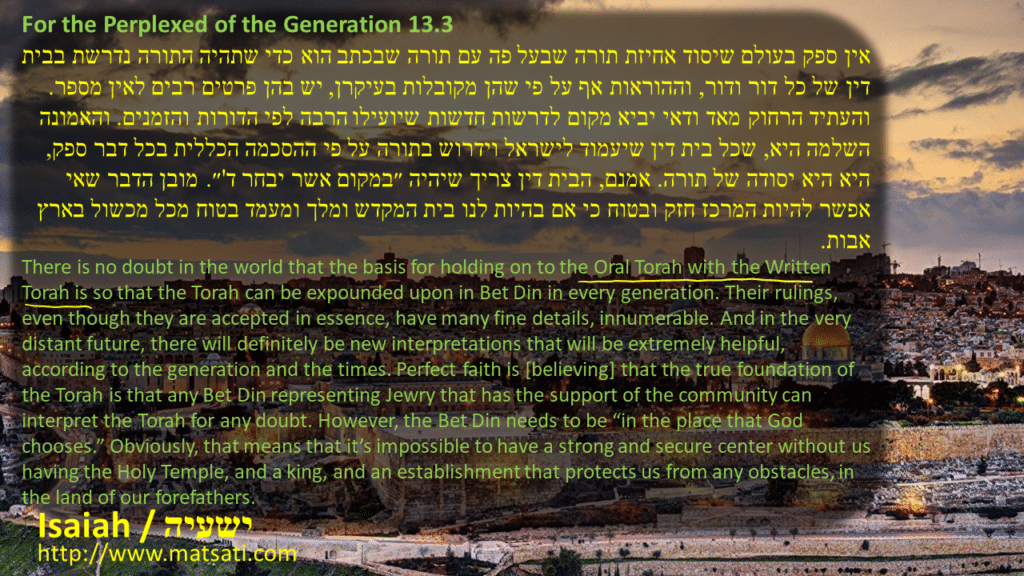
For the Perplexed of the Generation 13.3
אין ספק בעולם שיסוד אחיזת תורה שבעל פה עם תורה שבכתב הוא כדי שתהיה התורה נדרשת בבית דין של כל דור ודור, וההוראות אף על פי שהן מקובלות בעיקרן, יש בהן פרטים רבים לאין מספר. והעתיד הרחוק מאד ודאי יביא מקום לדרשות חדשות שיועילו הרבה לפי הדורות והזמנים. והאמונה השלמה היא, שכל בית דין שיעמוד לישראל וידרוש בתורה על פי ההסכמה הכללית בכל דבר ספק, היא היא יסודה של תורה. אמנם, הבית דין צריך שיהיה ״במקום אשר יבחר ד’״. מובן הדבר שאי אפשר להיות המרכז חזק ובטוח כי אם בהיות לנו בית המקדש ומלך ומעמד בטוח מכל מכשול בארץ אבות.
There is no doubt in the world that the basis for holding on to the Oral Torah with the Written Torah is so that the Torah can be expounded upon in Bet Din in every generation. Their rulings, even though they are accepted in essence, have many fine details, innumerable. And in the very distant future, there will definitely be new interpretations that will be extremely helpful, according to the generation and the times. Perfect faith is [believing] that the true foundation of the Torah is that any Bet Din representing Jewry that has the support of the community can interpret the Torah for any doubt. However, the Bet Din needs to be “in the place that God chooses.” Obviously, that means that it’s impossible to have a strong and secure center without us having the Holy Temple, and a king, and an establishment that protects us from any obstacles, in the land of our forefathers.
Here Rav Kook connects the Torah to the Mishnah. The Mishnah is the first major written collection of the Jewish oral traditions which is known as the Oral Torah. Rav Kook describes the importance of the Oral Torah for the halachic rulings, interpretations, and application of the Torah for every community, specifically, for every Beit Din representing a Torah-based community. Most importantly, to be in the place and position that God wants for our lives. The rabbis illustrate this by the building of the Temple in Jerusalem, and being in the Land of Promise, Israel. These things remind us of what Paul wrote to the Thessalonians according to 2 Thessalonians 2:3-17.
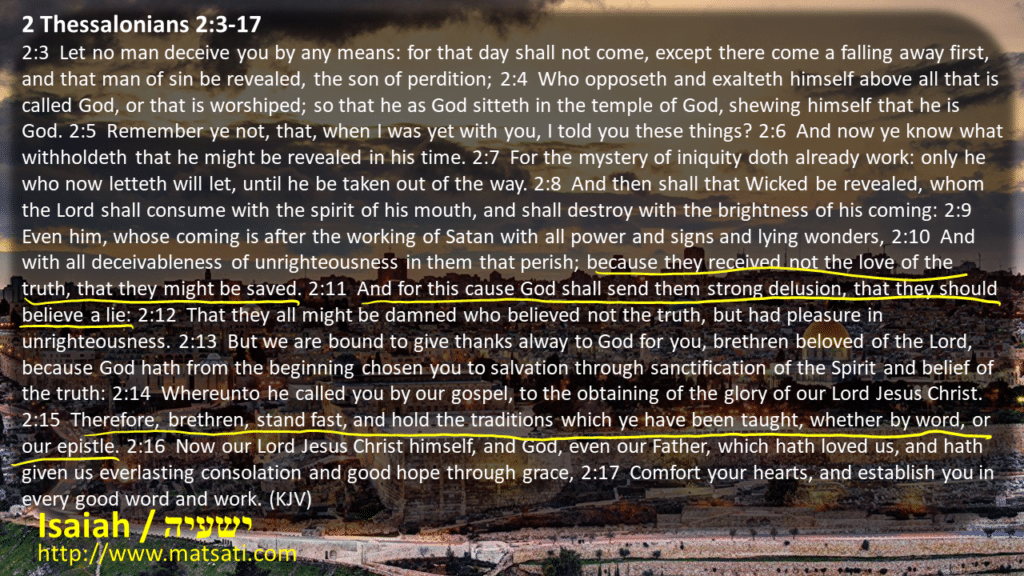
2 Thessalonians 2:3-17
2:3 Let no man deceive you by any means: for that day shall not come, except there come a falling away first, and that man of sin be revealed, the son of perdition; 2:4 Who opposeth and exalteth himself above all that is called God, or that is worshiped; so that he as God sitteth in the temple of God, shewing himself that he is God. 2:5 Remember ye not, that, when I was yet with you, I told you these things? 2:6 And now ye know what withholdeth that he might be revealed in his time. 2:7 For the mystery of iniquity doth already work: only he who now letteth will let, until he be taken out of the way. 2:8 And then shall that Wicked be revealed, whom the Lord shall consume with the spirit of his mouth, and shall destroy with the brightness of his coming: 2:9 Even him, whose coming is after the working of Satan with all power and signs and lying wonders, 2:10 And with all deceivableness of unrighteousness in them that perish; because they received not the love of the truth, that they might be saved. 2:11 And for this cause God shall send them strong delusion, that they should believe a lie: 2:12 That they all might be damned who believed not the truth, but had pleasure in unrighteousness. 2:13 But we are bound to give thanks alway to God for you, brethren beloved of the Lord, because God hath from the beginning chosen you to salvation through sanctification of the Spirit and belief of the truth: 2:14 Whereunto he called you by our gospel, to the obtaining of the glory of our Lord Jesus Christ. 2:15 Therefore, brethren, stand fast, and hold the traditions which ye have been taught, whether by word, or our epistle. 2:16 Now our Lord Jesus Christ himself, and God, even our Father, which hath loved us, and hath given us everlasting consolation and good hope through grace, 2:17 Comfort your hearts, and establish you in every good word and work. (KJV)
Note all of the concepts introduced in “For the Perplexed of the Generation 13.3” are found here in 2 Thessalonians 2:3-17. We read about the one who sins opposes the truth of God and exalts himself above all, of the delusion that is sent to believe a lie, and to those who are called of God to walk in His ways, to share in the glory of the Messiah, and Paul writes to hold to the traditions that were taught and given. This concept of tradition can have multiple implications, especially if those traditions are such that speak contrary to the Torah of God. The Major point is that of the people walking away from the Lord and the outcome of doing so. Isaiah says according to TgJ “the people shall be like the burning fuel of fire: no man shall spare his brother.” יח בְתַעְבוּר מִן קֻדם יוי צְבָאֹות חְרֹובַת אַרעָא וַהְוָה עַמָא כִיקֵידַת נוּר גְבַר עַל אְחוּהִי לָא חָייְסִין׃ 9:19 Through the wrath from before the presence of the Lord of hosts the earth shall be burnt up, and the people shall be like the burning fuel of fire: no man shall spare his brother,” and “For all this they do not turn away from their sins, that His anger might turn away from them; but still they hold fast their rebellion, and yet His stroke is ready to take vengeance on them.” (TgJ) We need to consider these things in our lives, and to be at all times intentional in our walk with God, to see His ways, and to believe in His Messiah Yeshua and the work that He did, understanding that eternal life is a gift of God, and our living for the Lord is a work of the Spirit of God in our lives. Because of these things, all glory goes to God in heaven! Hallelujah!
